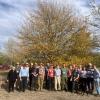Editor's Picks
Plant Focus
Protection and Conservation Actions through the Extinction Risk Assessment Method for Five Endemic Mexican Oak Species
Project Contact: Maribel Arenas Navarro, Postdoctoral Researcher, Instituto de Investigaciones en Ecosistemas y Sustentabilidad (IIES) UNAM, Antigua Carretera a Pátzcuaro No. 8701, Morelia, Michoacán, Mexico. C.P. 58190.
Project Summary: The main objective of the project is to provide information required to list Quercus cualensis, Q. tuitensis, Q. nixoniana, Q. centenaria, and Q. mexiae under the NOM-059 (Official Mexican Standard for protection of native species) and update their IUCN categories for further protection and conservation action. The information will include distribution maps (current and with climate change), the current state of populations, germination rates, etc. In addition, the project aims to establish educational strategies to emphasize the importance of the species to the community.
Executive Summary: It has been recognized that oaks play an important ecological role in several ecosystems and are recognized as key species; that means they are species that provide habitats for a large number of organisms, contribute to forming the soil, have several types of interactions with ectomycorrhizal fungi, and provide food with their fruits (acorns) to animals, such as squirrels, woodpeckers, peccaries, and insects. In Mexico, oaks mainly inhabit temperate forests, however, we can also find oaks in a wide variety of ecosystems, such as dry forests or cloud forests. In western Mexico (state of Jalisco) we can find a mountainous region known as the Serranias Meridionales de Jalisco that includes three municipalities: Talpa de Allende, El Tuito and Cabo Corrientes; in this area, we can find about 30 oak species, which is why it is considered as high richness and endemism center for red oaks (Lobatae section). In this region, two micro-endemic species are found (which means that they are only found in this place in the world): Quercus cualensis and Q. tuitensis; moreover, three endemic species to southwestern Mexico are also located: Q. nixoniana, Q. centenaria and Q. mexiae. The recent IUCN evaluation (2020) placed Q. cualensis and Q. nixoniana as endangered, Q. centenaria and Q. mexiae as data deficient, and Q. tuitensis as vulnerable. In addition, unfortunately, none of these species is found in NOM-059, which is the Mexican standard in charge of providing protection to species, which is why they are susceptible to threats such as deforestation, land use change, and global climate change. That is why the main objective of our project is to provide the necessary information, such as distribution maps (current and with climate change), the current state of the populations, germination rates, etc., to achieve the inclusion of these species in the NOM-059 and assign an IUCN category. Likewise, we will establish educational strategies and reevaluate the importance of the species to the community. Our previous work in the study area has allowed us to learn about the concerns of the communities regarding the deforestation that occurred a few years ago so that we will establish mitigation strategies with the community. We will give workshops to learn about the importance of oaks in the region and the importance of preserving endemic species in hand with a legal framework to achieve their long-term protection.
Final Report: click here to download.

Further Reading

















